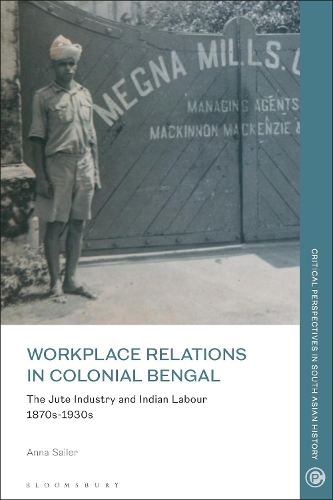
Workplace Relations in Colonial Bengal: The Jute Industry and Indian Labour 1870s-1930s
(Hardback)
Available Formats
Publishing Details
Workplace Relations in Colonial Bengal: The Jute Industry and Indian Labour 1870s-1930s
By (Author) Anna Sailer
Bloomsbury Publishing PLC
Bloomsbury Academic
24th February 2022
United Kingdom
Classifications
Tertiary Education
Non Fiction
Colonialism and imperialism
Asian history
331.880954
Physical Properties
Hardback
312
Width 156mm, Height 234mm
608g
Description
This book connects the history of labour movements with the transformation of workplace relations in South Asia from the late 19th century to the 1930s. Contending that labour conflicts in the Bengal jute industry must be understood against the backdrop of a radical change in the organisation of work in this period, Sailer shows how this led to a rupture in workers relations in the workplace and beyond. Moving away from polarities such as class/culture or modernity/tradition and reconsidering the context around industrial conflicts in this period, Workplace relations in Colonial Bengal offers a new framework to analyse the changing organisation of work in colonial India, and identifies the implications for worker relations both inside and outside the factory. Focusing on a major colonial era industry, this book opens up new perspectives n the history of workers and colonial capitalism in modern India.
Reviews
This book reminds us that we must know what happens on the shop-floor to understand the factory. In South Asian labour historiography, we have theorized capitalist strategy without paying sufficient attention to the actual work process. It is also blindingly obvious, as the author of this book points out, that workers everyday experience of work is critical to their politics. * Samita Sen, Vere Harmsworth Professor of Imperial and Naval History, Cambridge University, UK *
[This book] highlights the importance of work relations and the organisation of work conventionally known as labour process theory in our understanding of the Jute Industry, its working population and its political economy between the 1870s and the 1940s in CalcuttaThe discussion presented in the monograph is illuminating and analytically valuable. * Dhiraj Kumar Nite, Social Scientist, Ambedkar University Delhi, India *
Author Bio
Anna Sailer is Lecturer at the Centre for Modern Indian Studies at Georg-August University, Gttingen, Germany.
